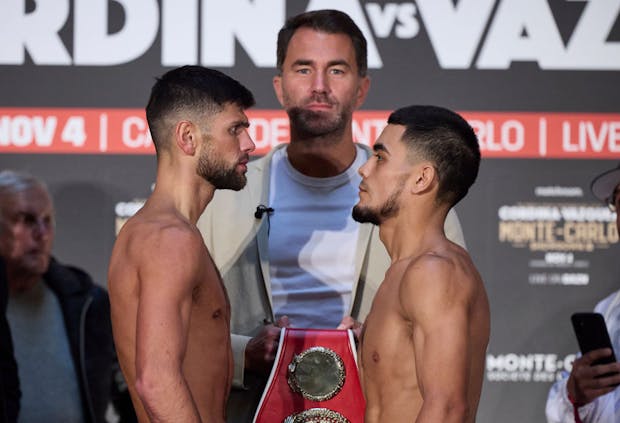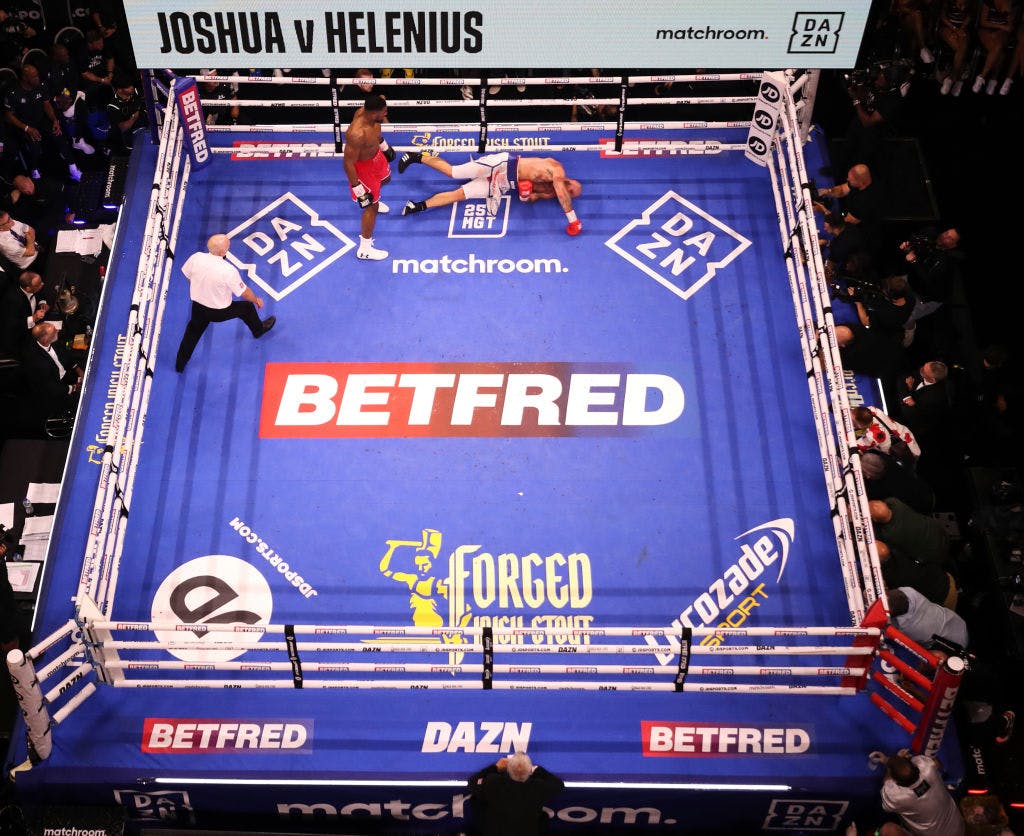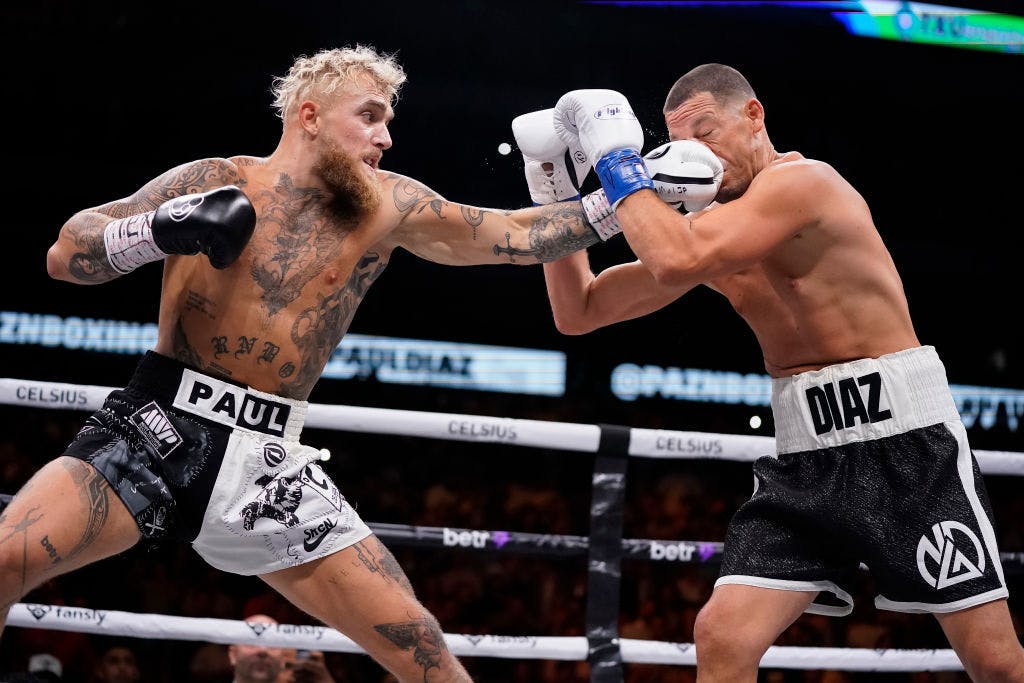
On a balmy Monaco evening at the Casino de Monte Carlo in front of a star-studded audience clad in extravagant gowns and tuxedos, Matchroom chairman Eddie Hearn looks right at home. It’s a far cry from the snooker halls of Essex where it all began.
The now global sports event promotion was formed in 1982 by Eddie’s father, Barry Hearn, as a snooker promotion based out of offices in Romford. Despite making an initial foray into the boxing space in 1987, it wasn’t until Eddie began to take a more active role in the company that boxing, Eddie’s passion, became the promotion’s flagship property.
“It’s a bit like sitting at a roulette table. You’re stacking the chips and stacking the chips and you can’t believe what’s happening,” Hearn tells SportBusiness in an exclusive interview on the sidelines of two world title fights in Monaco on November 4.
“My dad never expected to be in this position. And it’s quite amazing to see him looking at the business so proud.”
Over 40 years on from the promotion’s launch, Barry has taken a step back from proceedings with Eddie taking on the bulk of the business responsibility. Matchroom finds itself in what Hearn describes as a “globally great position” having established itself as one of the leading boxing promotions in Europe and the United States, partnering with subscription streaming platform DAZN on a global basis from 2021 onward.
But with Matchroom enjoying international success, harder decisions are on the horizon. Private equity groups and sovereign wealth funds have shown strong interest in acquiring minority stakes in the business, which would transform Matchroom from a family-run operation to a more corporate entity.
In 2022, Matchroom came very close to selling a minority stake in the business. It is understood that Matchroom held discussions with CVC Capital Partners, Kohlberg Kravis Roberts & Co (KKR) and Searchlight Capital. The Hearns are thought to have come close to agreeing a deal with CVC that would have valued Matchroom at somewhere in the region of £700m (€800m/$869m), but talks eventually broke down.
“It was a deal that might have been approved by other members of the board. But we didn’t need to do this. Although some people look at minority investments as a must, or a need, we don’t need to, we can go straight to sale,” Hearn says.
“For years and years, the business was on the line [between profit and loss]. Then it got to a point where we were 20, 30, 40, 50 million pounds ebitda. And then we get all these people approaching us, wanting to buy us, saying they want to help us float, they want a minority investment. For two or three years, we said we were not interested. And then as we expanded globally, we realised the potential that we had.”
On the subject of taking outside investment to reach that potential, Hearn says: “We can get there alone, but we know we could get there faster.”
He continues: “The partnership [with CVC] was very close. And the deal may still happen in time. Talks are ongoing.”
Never shy of taking a forward step, Hearn states that Matchroom’s current value stands at the £1bn mark.
“I think we’re a billion pound company at the moment. And I think we’ll be worth over two billion. And we see the projections of where we’re going to go.”

From a Matchroom perspective, outside investment is a tool to accelerate the company’s progression toward going public – something Hearn feels is inevitable.
“Ultimately, we will float this business and the timeframe that it takes will depend on how aggressive we are.”
Like the Hearns, Matchroom chief executive Frank Smith is an Essex native. Having first met the Hearn’s when he was 14 years old, Smith’s rise within the company is indicative of the family culture that Matchroom wants to preserve. That culture is central to the group’s reservations about selling.
“We don’t want to change the way we’ve built the business to where it is,” says Smith. “We’ve created this and everyone has been a part of that. You don’t want to change and take away what got you to that point, having people coming in asking ‘why’d you do this?, why’d you do that?’ when they actually don’t really understand the business.”
Smith also says finding the right partner means helping to expand in major markets internationally.
“We’re delivering boxing in 10 different territories a year with 40 events, as well as darts being all over the world so I think [acceleration means] continued investment and growth in new territories and actually building out plans and changing the mindset, while retaining what’s great about being a family business. But also, on that larger scale, going and investing and doing XYZ to build this business in new markets.”
Smith emphasises, however, that the incentive is not so much in the need for money but in the network of opportunities it could open up.
“I think it’s about relationships and partnerships. They’ve helped us expand the business quite quickly in the past. The networks [a potential partner] would have in say Asia… it’s just about relationships.”
Any potential deal would only see a third party acquire a minority stake in the company.
“There’s been conversations anywhere between 15 and 30 per cent,” Hearn adds.
Even so, he played down reports that any deal is off the table, admitting to SportBusiness that a minority investment deal will probably get done, it’s just a question of who and when.
“Look, it’ll probably happen…I just think it’s got to be a deal that’s 100 per cent right for us.”
DAZN the difference maker
Part of Matchroom’s recent success is down to its global partnership with subscription streaming service DAZN, which began in 2018 when the two created a boxing-focused joint venture in the United States.
The agreement was then expanded to a global deal that included the United Kingdom and Ireland in 2021 – a five-year deal to make the DAZN the exclusive home of Matchroom fights around the world as well as the UK and Ireland (excluding those featuring Anthony Joshua).
The deal ended a 24-year long working relationship between Matchroom and Sky, the dominant UK pay-television broadcaster.
“We’re all in on DAZN. A few years ago, we made a decision. We left Sky in the UK, which was our premier market because we believe that the future of live sports is in streaming,” Hearn says.
While Matchroom lost some exposure in the UK by moving away from the Sky marketing machine, it has found success in centralising its content on DAZN, enabling the promotion to continue building storylines for fighters on a single platform with a relatively low subscription cost.
In boxing’s modern era, pay-per-view has long reigned supreme with the business centred around promoters putting together as many high-profile fights as possible, selling the narrative to those fights, and reaping the rewards from the pay-per-view receipts. As he was in 2018 when DAZN prematurely declared pay-per-view ‘dead’, Hearn still wants to move away from the model.
“[With Sky} we were doing seven UK pay-per-views a year, and we haven’t done one since we joined DAZN. But for us, we wanted to move away from that model,” he says.
The United States in particular has seen boxing fans forced to pay a premium to watch most boxing content, but the streaming model is still a work in progress in a region where pay-per-view has grown synonymous with the sport.
“Particularly in America, the model is too expensive. I think it’s $90 [€83] for pay per view. I get torn apart in the UK public for doing £25 pay-per-views and then I see packages for £70. I just think that price point is too expensive.”
Hearn concedes that despite a desire to streamline subscription boxing, promoters like himself have to be realistic about certain fights remaining on pay-per-view: “If it’s a megafight, I get it. But overall I think the price point needs to come down, but I like the subscription model. The problem with boxing is that every now and again, a fight will become too expensive to do on non pay-per-view.”
In the background, the past few months have provided yet another twist in the boxing tale with news that one of its biggest competitions, Premier Boxing Champions (PBC), will soon be without a major broadcast deal in the United States after Paramount Global’s Showtime, the 37-year boxing mainstay in US television, announced that it would be closing down at the end of this year.
“I said two or three years ago, Showtime will be out of boxing. The business wasn’t working in my opinion but it was only because of the stubbornness of Stephen Espinoza and his competitive spirit,” states Hearn.
Hearn’s assertion is a nod to the relationship they’ve carved out with DAZN, consistent with his belief that the health of a broadcaster now is directly correlated with the health of modern boxing.
“[Espinoza’s} done a great job for boxing, but just not for Showtime. The boxing business for them didn’t work because of inflated purses and too many poor shows that weren’t doing good ratings.”
PBC is now on the hunt for a long-term broadcasting contract and has reportedly opened preliminary discussions with Amazon Prime and Netflix. The promotion has also reportedly begun talks with DAZN and Hearn has given his blessing for them to appear on the platform.
“People always ask ‘are you worried PBC might get on DAZN?’ No, fantastic. All we care about, along with our business and the sport, is the success of DAZN. Whilst they continue to flourish, so do we. By acquiring PBC we would become the dominant platform.”
Smith believes the current saturation of promoters and broadcasters in the industry is coming at the cost of more entertaining events: “We need to make proper fights. What it all comes down to is you need to create entertainment, you need to put things on that people are interested in watching.
“For so long, there’s been so much competition in the market, and so much money in the sport that people have gotten away with having fights which aren’t interesting. We’re all guilty of that. I’m not pointing at other promoters. There’s just so much competition.”
The prospect of PBC joining DAZN gets more intriguing given the recent decision of superstar Canelo Alvarez to swap Matchroom Boxing for a short-term deal with PBC. Whether a PBC-DAZN partnership could see Canelo once again feature on a Matchroom promoted card remains to be seen but the opportunity for collaboration between PBC and Matchroom for more frequent big fights is likely the reason for Hearn’s stance.
Big fights and influencer boxing
On the other end of the boxing spectrum, the rise of influencer boxing has caused a considerable disruption throughout the sport with celebrities beginning to attract high ratings and subsequently lucrative pay days.
The new trend has divided opinion within the community. To industry veterans, it feels like a mockery to what they’ve devoted their careers to growing. To others, it’s welcome news for a sport that needed a jump-start among the youth and casual audiences.
Are certain fighters growing frustrated? “Some of them, yes,“ admits Hearn. “I think the ones that commercially understand the world aren’t. Some say, ‘this is a joke. He’s making a couple of million while I’ve been training my whole life’ but then I say ‘Well you never built a following, or you’re not good enough’ and that’s life.”

The clamour for more attractive fights has been one theory as to why influencers have begun to take over – as a means of satisfying that void.
Hearn disagrees “I just think it became big because the world is changing. You have all these celebrities or influencers or content creators that are engaging with audiences that have earned the right to do whatever they want and they chose boxing…at least it gives us a chance to convert those people.”
But at the end of the day, boxing is a sport that’s value is not so much in the fights themselves but the storylines attached to them.
Some professional boxers have expressed frustration at the pay disparity between themselves and some of the YouTube fights.
“That’s on them,” says Smith. “These [influencers] are tremendous marketeers and brands in their own right. Elite fighters can learn a lot [from influencers]. Despite being tremendous individuals, sometimes [fighters] don’t understand that element. It’s not just about being the best boxer in the world if you haven’t got that personality.”
Hearn and Smith believe the two sides of boxing can not only learn to coexist but work together so that influencer boxing can become somewhat of a gateway drug to the ‘real’ sport.
“The argument is if DAZN added 1.3 million subscribers from a given fight, firstly, how many stayed? Then, how many of the 1.3 million watched a fight like Monaco [on November 4]? The answer is probably down towards 10 per cent. But if they do decide to like it and start to follow boxing that can only be a positive,” adds Hearn.
“And we don’t know these people who follow a boxing influencer. Maybe it gets them to an amateur gym. When they go to an amateur gym, maybe they’re falling in love with boxing, when they fall in love with boxing they won’t want to watch influencers anymore.”
Building from Hearn’s point, Smith feels as though the real dividends will be paid in the long-term: “I think it’s good for the sport. I really do. I don’t think you’re going to see the impacts in the boxing we deliver today. I think it’ll be in 10 years. Anything that drives a new audience or generation to the gym, then we’re going to be good. It doesn’t matter whether they start watching in five or 10 years time. If they’re into boxing, that’s good.”